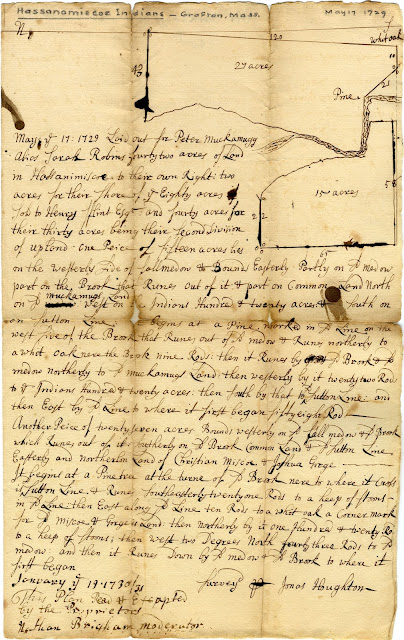Hassanamisco Indians
I love this document. It's a survey of property allotted to Hassanamisco Nipmuc Sarah Robins who married Peter Muckamaug. Though Native, Peter was not from Hassanamesit so the land could not be allotted to (or owned by) him. When Sarah Robins died, the land passed to her children.
The Muckamaug allotment was originally 106 acres. The land came from the division of the Hassanamisco Praying Plantation. Praying Plantations, or towns, were the colonial Massachusetts equivalent to today's reservation system. The Praying Town at Hassanamesit was 8000 acres. In 1728, the MA Bay government allowed those 8000 acres to be divided up between 40 English proprietors and 7 Native families. Land was also set aside for a Native church and school and stipulations made for a minister and teacher. The 7 Native families received 1200 acres in separate parcels. The rest was sold to the 40 proprietors and monies from the sale deposited for use by the Hassanamiscos. Since it was not believed that Native people could control their own resources, guardians were appointed to oversee their assets. Native people throughout Massachusetts could not sell their land or spend even the interest on their money without asking their guardians to petition the legislature until 1869.
Another map from the collections of American Antiquarian Society showing part of the 1728 allotments. This was posted on a Grafton, MA town webpage.
Part of the Muckamaug allotment is now owned by the town of Grafton and is preserved as "Hassanamesit Woods".The Fiske Center for Archaeological Research is conducting an archaeological dig in Hassanamesit Woods where the Muckamaug's great-granddaughter's house stood from at least 1790 to 1923 when it was bulldozed over. The story of 4 generations of Nipmuc women living on this land will be coming to this blog soon!
(You may have noticed that sometimes I write Hassanamisco and sometimes Hassanamesit. Hassanamesit refers to the land and means "the place of many small stones". Hassanamisco refers to the people of that land.)
Until next time,
Aquene!



Cheryll,
ReplyDeleteCould you supply a phonetic spelling for Hassanamisco and Hassanamesit?
Mark Farrell